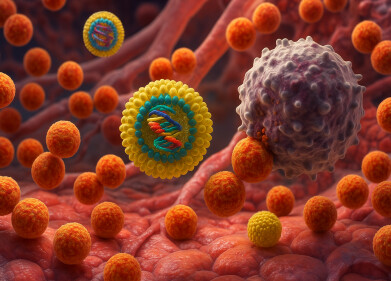News
Taking Chip Technology to Point of Use
Feb 13 2021
Researchers at the University of Bristol have developed a way of producing the soft-lithographic moulds used for fabricating microfluidic devices using low-cost 3D-printing techniques. Coupled with the open-source resources developed by the team, this alternative technology has the potential to accelerate uptake and development of on-chip diagnostic techniques in parts of the world where rapid point of care (POC) diagnoses are needed.
“Previously, techniques for producing the soft-lithographic scaffolds/moulds (microfluidic channel patterns) were time-consuming and extremely expensive, while other low-cost alternatives were prone to unfavourable properties. This development could put Lab-On-a-Chip prototyping into the hands of researchers and clinicians who know the challenges best, in particular those in resource-limited settings, where rapid diagnostics may often have the greatest impact,” said the study’s lead author Dr Robert Hughes.
“This technique is so simple, quick & cheap that devices can be fabricated using only everyday domestic or educational appliances and at a negligible cost (~0.05% of cost of materials for a single microfluidic device). This means researchers and clinicians could use our technique and resources to help fabricate rapid medical diagnostic tools, quickly and cheaply, with minimal additional expertise or resources required,” said co-author, Mr Harry Felton.
“The simplicity and minimal cost of this technique, as well as the playful click-and-connect approach developed, also makes it suitable for hobbyists and educational use, to teach about microfluidics and the applications of lab-on-a-chip technology,” added co-author Ms Andrea Diaz Gaxiola.
“It is our hope that this will democratise microfluidics and lab-on-a-chip technology, help to advance the development of point-of-care diagnostics, and inspire the next generation of researchers and clinicians in the field,” said Dr Hughes.
The next step for the team is to identify potential collaborators in both research and education to help demonstrate the impact this technology could have in both settings by developing and supporting outreach activities and applications for on-chip diagnostic testing.
The research was a result of activities funded by the EPSRC, via the BristolBridge initiative, and pump-prime funding from the Faculty of Engineering, as well as work done as part of the Twinning of Digital-Physical Models During Prototyping project, funded by the EPSRC.
'Negligible-cost microfluidic device fabrication using 3D-printed interconnecting channel scaffolds' by Felton, H., Hughes, R., & Diaz-Gaxiola, A., in PLOS ONE
Digital Edition
Lab Asia Dec 2025
December 2025
Chromatography Articles- Cutting-edge sample preparation tools help laboratories to stay ahead of the curveMass Spectrometry & Spectroscopy Articles- Unlocking the complexity of metabolomics: Pushi...
View all digital editions
Events
Jan 21 2026 Tokyo, Japan
Jan 28 2026 Tokyo, Japan
Jan 29 2026 New Delhi, India
Feb 07 2026 Boston, MA, USA
Asia Pharma Expo/Asia Lab Expo
Feb 12 2026 Dhaka, Bangladesh




















